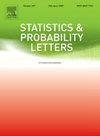Confidence set for mixture order selection
IF 0.7
4区 数学
Q3 STATISTICS & PROBABILITY
引用次数: 0
Abstract
A fundamental challenge in approximating an unknown density using finite Gaussian mixture models is selecting the number of mixture components, also known as order. Traditional approaches choose a single best model using information criteria. However, often models with different orders yield similar fits, leading to substantial model selection uncertainty and making it challenging to identify the optimal number of components. In this paper, we introduce the Model Selection Confidence Set (MSCS) for order selection in Gaussian mixtures – a set-valued estimator that, with a predefined confidence level, includes the true mixture order across repeated samples. Rather than selecting a single model, our MSCS identifies all plausible orders by determining whether each candidate model is at least as plausible as the best-selected one, using a screening based on a penalized likelihood ratio statistic. We provide theoretical guarantees for asymptotic coverage, and demonstrate its practical advantages through simulations and real data analysis.
混合顺序选择的置信度
使用有限高斯混合模型近似未知密度的一个基本挑战是选择混合成分的数量,也称为顺序。传统方法使用信息标准选择一个最佳模型。然而,具有不同阶数的模型通常会产生相似的拟合,从而导致大量的模型选择不确定性,并使确定最佳组件数量具有挑战性。在本文中,我们引入了用于高斯混合序列选择的模型选择置信集(MSCS) -一个集值估计器,具有预定义的置信水平,包括重复样本的真实混合顺序。我们的MSCS不是选择单一模型,而是通过使用基于惩罚似然比统计的筛选,确定每个候选模型是否至少与最佳选择的模型一样可信,从而识别所有合理的顺序。我们为渐近覆盖提供了理论保证,并通过仿真和实际数据分析证明了其实际优势。
本文章由计算机程序翻译,如有差异,请以英文原文为准。
求助全文
约1分钟内获得全文
求助全文
来源期刊

Statistics & Probability Letters
数学-统计学与概率论
CiteScore
1.60
自引率
0.00%
发文量
173
审稿时长
6 months
期刊介绍:
Statistics & Probability Letters adopts a novel and highly innovative approach to the publication of research findings in statistics and probability. It features concise articles, rapid publication and broad coverage of the statistics and probability literature.
Statistics & Probability Letters is a refereed journal. Articles will be limited to six journal pages (13 double-space typed pages) including references and figures. Apart from the six-page limitation, originality, quality and clarity will be the criteria for choosing the material to be published in Statistics & Probability Letters. Every attempt will be made to provide the first review of a submitted manuscript within three months of submission.
The proliferation of literature and long publication delays have made it difficult for researchers and practitioners to keep up with new developments outside of, or even within, their specialization. The aim of Statistics & Probability Letters is to help to alleviate this problem. Concise communications (letters) allow readers to quickly and easily digest large amounts of material and to stay up-to-date with developments in all areas of statistics and probability.
The mainstream of Letters will focus on new statistical methods, theoretical results, and innovative applications of statistics and probability to other scientific disciplines. Key results and central ideas must be presented in a clear and concise manner. These results may be part of a larger study that the author will submit at a later time as a full length paper to SPL or to another journal. Theory and methodology may be published with proofs omitted, or only sketched, but only if sufficient support material is provided so that the findings can be verified. Empirical and computational results that are of significant value will be published.
 求助内容:
求助内容: 应助结果提醒方式:
应助结果提醒方式:


